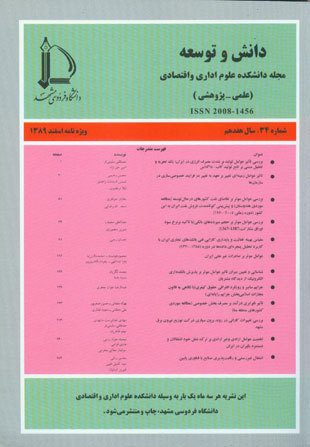Estimating marginal propensity to consume for income groups on the basis of relative permanent income hypothesis in Iran
Author(s):
Abstract:
Marginal propensity to consume (MPC) in income groups has a great importance in macroeconomic policy making. But due to some restrictions, such as lack of direct data for income and consumption groups in Iran's statistical yearbooks, estimation of MPC for income groups has not been done yet. The purpose of this study is to estimate the MPC for income groups by using the relative permanent income hypothesis (RPI), introduced in recent economic literature. Also in this research, the effects of income distribution on MPC of income groups will be analyzed. To this end, ordinary least square (OLS) method is used during 1982-2006 period. Study results confirm a significant relationship between MPC and RPI. According to estimates, MPC for low, medium and high income groups is 0/995, 0/84 and 0/7, respectively. Short run estimate of MPC shows that with increase of MPC for one income group, the MPC for another income group will decline. Among other result in this study is that in Iran economy, unfair (fair) distribution of income, will not decrease (increase) consumption enough to increase (decrease) saving to optimal level.
Language:
Persian
Published:
Journal of Knowledge and Development, Volume:16 Issue: 29, 2010
Page:
21
magiran.com/p760765
دانلود و مطالعه متن این مقاله با یکی از روشهای زیر امکان پذیر است:
اشتراک شخصی
با عضویت و پرداخت آنلاین حق اشتراک یکساله به مبلغ 1,390,000ريال میتوانید 70 عنوان مطلب دانلود کنید!
اشتراک سازمانی
به کتابخانه دانشگاه یا محل کار خود پیشنهاد کنید تا اشتراک سازمانی این پایگاه را برای دسترسی نامحدود همه کاربران به متن مطالب تهیه نمایند!
توجه!
- حق عضویت دریافتی صرف حمایت از نشریات عضو و نگهداری، تکمیل و توسعه مگیران میشود.
- پرداخت حق اشتراک و دانلود مقالات اجازه بازنشر آن در سایر رسانههای چاپی و دیجیتال را به کاربر نمیدهد.
In order to view content subscription is required
Personal subscription
Subscribe magiran.com for 70 € euros via PayPal and download 70 articles during a year.
Organization subscription
Please contact us to subscribe your university or library for unlimited access!


